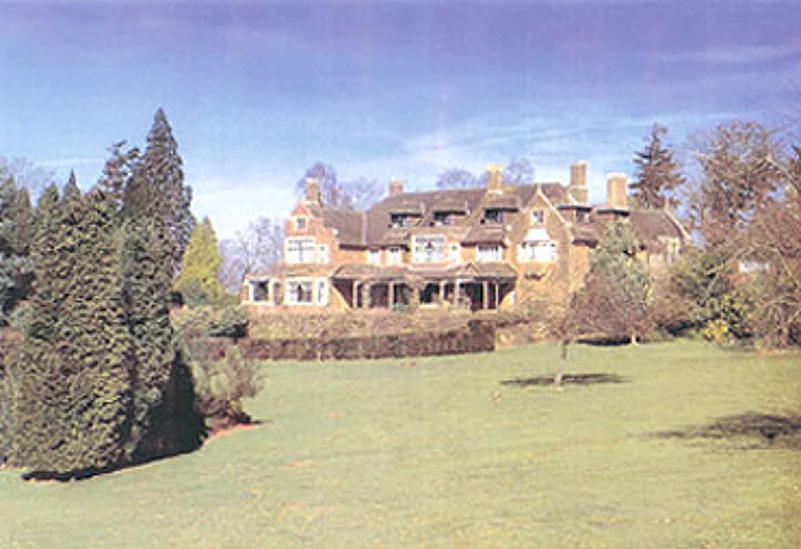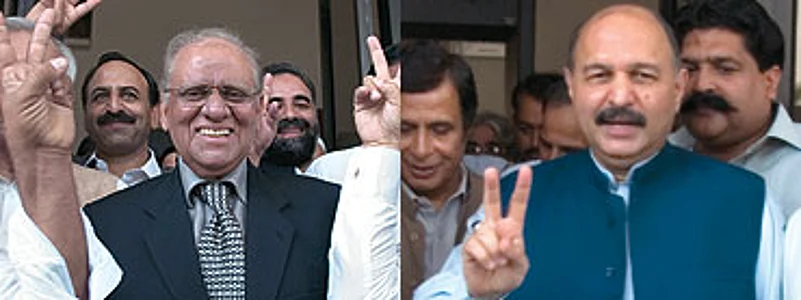Wading Through The Mudslide
A slew of corruption cases had been filed against Asif Ali Zardari, or Mr 10 per cent, but these were quashed by the National Reconciliation Order promulgated by the Musharraf regime. A look at some of the charges against him:
- Benami accounts: Accused of holding Swiss bank accounts containing $1.5 billion amassed from money laundering. Of this, $13.7 million was frozen by the Swiss authorities in 1997.
- The assets case: Properties of 155 people in Pakistan were frozen on the ground that these actually belonged to Zardari.
- The Polish tractors case: He is supposed to have accepted $2 million in kickbacks from the Polish firm Ursus for supplying low-cost tractors to Pakistan in 1997.
- The polo ground case: Illegally used the Capital Development Authority to build a polo ground in the prime minister’s house, where horses were fed apple murabba.
- The ARY gold case: Zardari is alleged to have received about $10 million for giving ary, a private firm, the monopoly of importing gold into Pakistan.
- SGC and Cotecna: These two Swiss companies allegedly paid him commissions for bagging contracts for pre-shipment inspection of import into Pakistan.
- The steel mill case: A former chairman of the state-owned Pakistan Steel Mill allegedly paid bribes for his appointment.
- The helicopters case: The Public Accounts Committee of Parliament held Benazir responsible for defrauding the country of $2.168 million in a helicopter purchase deal.
- Dassault Aviation: Zardari allegedly asked for $200 million from this military contractor in return for a $4-billion jet fighter deal. The deal couldn’t come through because the Benazir government fell.
***

This Surrey estate is one of several Zardari has admitted to owning
It’s impossible to list properties he owns worldwide, largely because many of them are held in benami ownership. But Zardari did admit to buying the $4 million, 355-acre Rockwood Estate (pictured above) in Surrey, England. In over 30 days in 1994-95, he allegedly used a Swiss bank account and an American credit card to buy jewellery worth $660,000.
***
The News, a Pakistani newspaper, commented on his brazen foray: "The fact of the matter is that Asif Zardari, no matter that no case has ever been proved against him, comes to the presidency mired in decades of doubt and suspicion as to his probity, his alleged greed, his obvious artfulness in matters political and a general lack of transparency that makes mud look as clear as spring water. His documented and undeniable period of mental ill-health is yet another layer in the 'onion of concern' that surrounds him."

Contrast: Siddiqui and Hussain are also running for president
His rival Mushahid Hussain didn't mince words: "We are worried about his mental health and want to know what kind of help and advice he was getting from the US Ambassador to the UN, Zalmay Khalilzad." The Bush administration, it may be recalled, had criticised Khalilzad for maintaining unauthorised contacts with Zardari, fearing that the US could be accused of meddling in Pakistani politics.
One thing is sure. Zardari commands the requisite numbers in the electoral college (Parliament and provincial assemblies) that elects the president. But there could still be roadblocks—some parties, though not the PML(N), are mulling the option of petitioning the Election Commission to disqualify Zardari on the grounds of being mentally unstable and corrupt. Another roadblock to Zardari's ambition could be his PPP colleague and renowned lawyer Aitizaz Ahsan, who has vowed to bring the country to a standstill to protest against the government's reluctance to restore the judiciary, particularly sacked chief justice Iftikhar Chaudhry. Should people join the lawyers' movement with the same passion as they did last year, the pressure could trigger a political realignment.
The Nation expects the lawyers' movement to gather tremendous momentum, compelling PML(N) leader Nawaz Sharif to give up his neutrality and join the All Parties Democratic Movement (APDM). This could sharpen the contradictions in the political class. The newspaper observed: "This would strengthen the hotheaded elements in the PPP and the PML(N). Elements in the PPP keen to gain control of Punjab (province) may use the confrontation to justify joining hands with the PML(Q) to form a new ruling coalition (in the province) led by the PPP." But then, the PML(N) is in talks with some PML(Q) leaders who have an axe to grind with Zardari. Not only could this prompt 'dissidents' in the PML(Q) to play spoilers in the election, they could also help bolster the PML(N) government of Shahbaz Sharif in Punjab should the PPP withdraw support.
Zardari, too, is playing his cards astutely. This week he restored eight sacked judges of the Sindh High Court, the very men who had refused to take oath under the Provisional Constitution Order (PCO) that Musharraf promulgated following the imposition of emergency on November 3. In a surprising about-turn, these eight judges took oath under the same PCO. This undercut the lawyers' demand that the sacked judges should be restored through an executive order—and shouldn't take oath under the PCO. Ahsan said, "This means they (the Sindh judges) have accepted the November 3 actions that Musharraf imposed as constitutional. They have accepted their dismissal as valid."
Many feel the Sindh judges' action could cause other judges to follow suit. The ensuing split in the judiciary could imperil Justice Chaudhry, who isn't expected to take a fresh oath as it would undermine his 10-month stance—that his dismissal was unconstitutional, and he should be reinstated, without taking oath, to uphold the rule of law.
If more judges take Zardari's bait, he could claim to have fulfilled the promise of reinstating the judges sacked by Musharraf. It could help him sideline Chaudhry and ensure his famed judicial activism wouldn't raise the spectre of annulment of the National Reconciliation Order that quashed all corruption and criminal cases against the Bhuttos. The serving law minister Farooq H. Naek said as much: "Iftikhar Chowdhury has become politically controversial. We have to think twice before reinstating him, as it will create a constitutional crisis."
These political machinations have disappointed the people, who had hoped that a democratically elected government would provide better governance than Musharraf. As leading human rights champion I.A. Rehman wrote recently, "The stark reality is that political parties have been competing with autocratic despots in inventing ever new excuses for denying the people their right to democratic choice."
And though Sharif may appear to have lost in the political manoeuvring—his party is not in government—he has the sympathy of the street. Dr Shirin Mazari, who was given 15 minutes by the coalition government to vacate her office at the Institute of Strategic Defence, of which she was director-general, said: "In this continuing political nightmare of broken promises, personalised rule and cronyism, it seems we are simply replacing a military uniform with civilian tyranny. That's why Sharif's moving away from the Asif Ali Zardari-led coalition offers the only speck of democratic hope. We are still clinging to straws." So much for democracy and the rule of law.





















